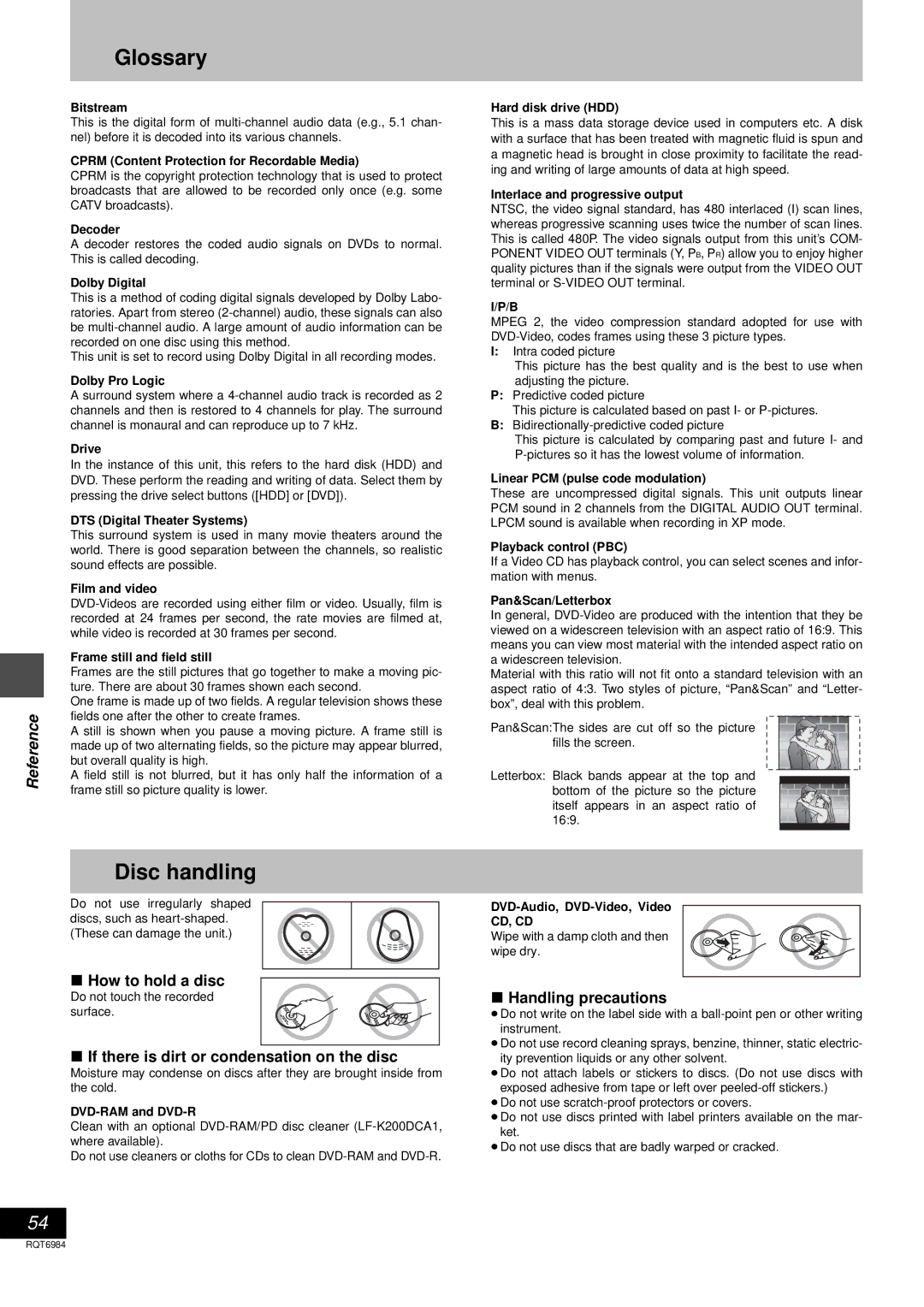
Glossary
Bitstream
This is the digital form of
CPRM (Content Protection for Recordable Media)
CPRM is the copyright protection technology that is used to protect broadcasts that are allowed to be recorded only once (e.g. some CATV broadcasts).
Decoder
A decoder restores the coded audio signals on DVDs to normal. This is called decoding.
Dolby Digital
This is a method of coding digital signals developed by Dolby Labo- ratories. Apart from stereo
This unit is set to record using Dolby Digital in all recording modes.
Dolby Pro Logic
A surround system where a
Drive
In the instance of this unit, this refers to the hard disk (HDD) and DVD. These perform the reading and writing of data. Select them by pressing the drive select buttons ([HDD] or [DVD]).
DTS (Digital Theater Systems)
This surround system is used in many movie theaters around the world. There is good separation between the channels, so realistic sound effects are possible.
Film and video
| Frame still and field still | |
| Frames are the still pictures that go together to make a moving pic- | |
| ture. There are about 30 frames shown each second. | |
| One frame is made up of two fields. A regular television shows these | |
Reference | fields one after the other to create frames. | |
A still is shown when you pause a moving picture. A frame still is | ||
| ||
| made up of two alternating fields, so the picture may appear blurred, | |
| but overall quality is high. | |
| A field still is not blurred, but it has only half the information of a | |
| frame still so picture quality is lower. |
Disc handling
Do not use irregularly shaped discs, such as
∫How to hold a disc
Do not touch the recorded surface.
∫If there is dirt or condensation on the disc
Moisture may condense on discs after they are brought inside from the cold.
DVD-RAM and DVD-R
Clean with an optional
Do not use cleaners or cloths for CDs to clean
54
Hard disk drive (HDD)
This is a mass data storage device used in computers etc. A disk with a surface that has been treated with magnetic fluid is spun and a magnetic head is brought in close proximity to facilitate the read- ing and writing of large amounts of data at high speed.
Interlace and progressive output
NTSC, the video signal standard, has 480 interlaced (I) scan lines, whereas progressive scanning uses twice the number of scan lines. This is called 480P. The video signals output from this unit’s COM- PONENT VIDEO OUT terminals (Y, PB, PR) allow you to enjoy higher quality pictures than if the signals were output from the VIDEO OUT terminal or
I/P/B
MPEG 2, the video compression standard adopted for use with
I:Intra coded picture
This picture has the best quality and is the best to use when adjusting the picture.
P:Predictive coded picture
This picture is calculated based on past I- or
B:
This picture is calculated by comparing past and future I- and
Linear PCM (pulse code modulation)
These are uncompressed digital signals. This unit outputs linear PCM sound in 2 channels from the DIGITAL AUDIO OUT terminal. LPCM sound is available when recording in XP mode.
Playback control (PBC)
If a Video CD has playback control, you can select scenes and infor- mation with menus.
Pan&Scan/Letterbox
In general,
Material with this ratio will not fit onto a standard television with an aspect ratio of 4:3. Two styles of picture, “Pan&Scan” and “Letter- box”, deal with this problem.
Pan&Scan:The sides are cut off so the picture fills the screen.
Letterbox: Black bands appear at the top and bottom of the picture so the picture itself appears in an aspect ratio of 16:9.
CD, CD
Wipe with a damp cloth and then wipe dry.
∫Handling precautions
≥Do not write on the label side with a
≥Do not use record cleaning sprays, benzine, thinner, static electric- ity prevention liquids or any other solvent.
≥Do not attach labels or stickers to discs. (Do not use discs with exposed adhesive from tape or left over
≥Do not use
≥Do not use discs printed with label printers available on the mar- ket.
≥Do not use discs that are badly warped or cracked.
RQT6984
